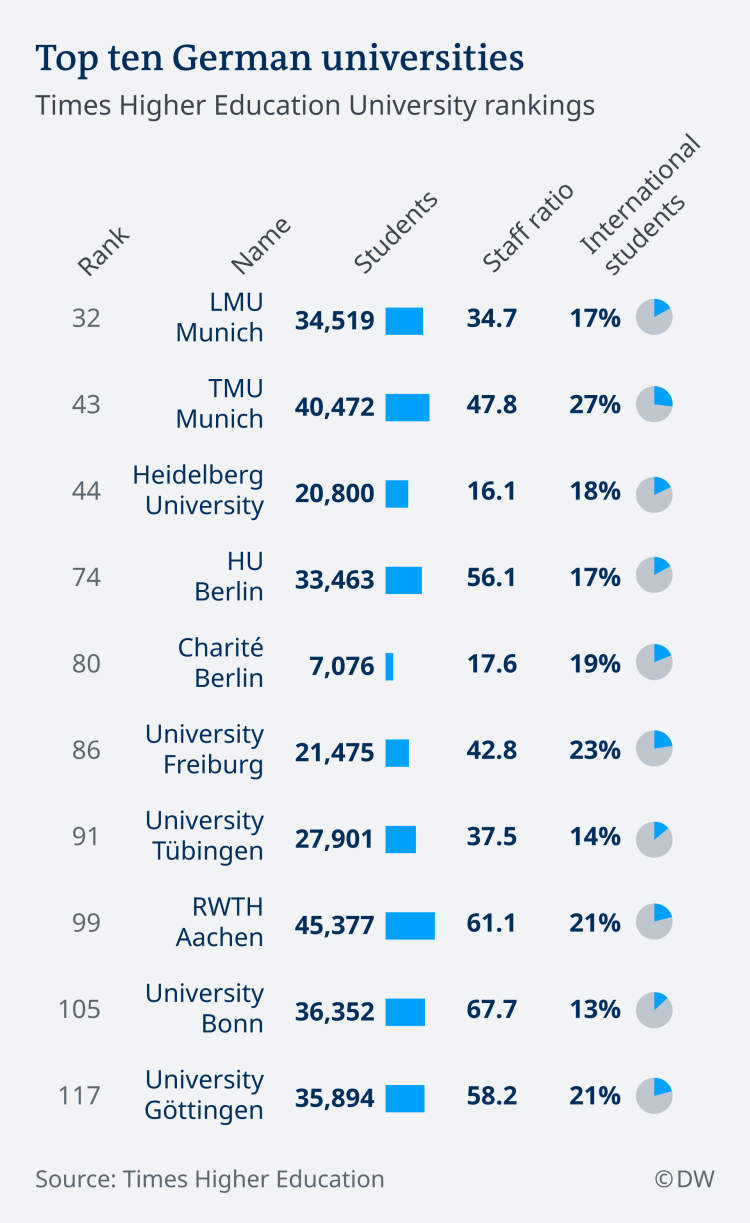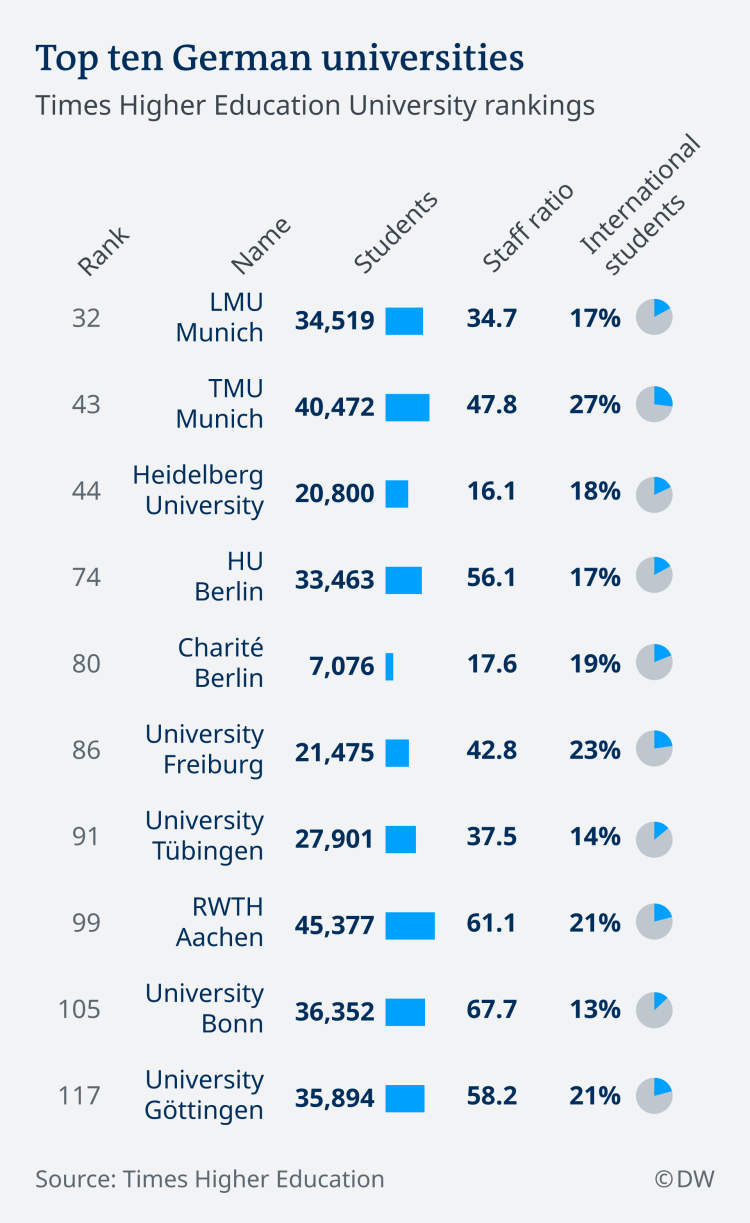Evaluating the academic excellence of a university can be daunting, but with the help of university rankings it provides valuable insights into each institution’s capacities. Looking at the educational landscape, Germany is home to some of the world’s best universities according to the world rankings. In this article, we take an overview of the top German universities based on university rankings.
A series of noteworthy rankings emphasise the educational level of German universities. Firstly, the Times Higher Education (THE) World University Rankings provides an assessment of the world’s best universities. Secondly, another international ranking, the QS World University Rankings, evaluates the universities with exclusive criteria. Lastly, the Academic Ranking of World Universities (ARWU) Shanghai Ranking lists institutions that provide the best education for students.
Top German Universities Overview
Germany is internationally renowned for its excellent education system, and its higher education institutions (HEIs) are renowned for the quality of their teaching and research. In recent years, there has been a significant increase in the popularity of studying in Germany, particularly among international students. An Overview of the Top German University Rankings examines the highest-ranking universities in Germany, as measured by various independent rankings.
Germany is home to many prestigious universities, which are renowned for the quality of their teaching and research. The most prestigious of these universities is the Ludwig Maximilian University of Munich (LMU), which is consistently ranked among the top universities in the world. Other well-known universities in Germany include the Technische Universität Berlin (TU Berlin), the Free University of Berlin (FU Berlin), and the Humboldt University of Berlin (HU Berlin), which together make up the German Academic Exchange Service (DAAD). Additionally, Germany is home to the world-renowned Max Planck Institute (MPI), and its subsidiary, the Max Planck Institute for Chemistry (MPIC).
In terms of international rankings, the Times Higher Education World University Rankings 2020-21 places LMU Munich in the top 40 universities in the world (ranked 34th). Additionally, it placed TU Berlin in the 81-90 range, FU Berlin in the 121-130 range, and HU Berlin in the 131-140 range. The Center for World University Rankings (CWUR) 2020-21 gave LMU Munich an overall ranking of 33rd in the world, with TU Berlin in the 88-98 range, FU Berlin in the 99-110 range, and HU Berlin in the 111-120 range.
Other reputable international rankings include the Quacquarelli Symonds (QS) World University Ranking 2020-21, which ranked LMU Munich 41st in the world, followed by TU Berlin (125th) and FU Berlin (127th). The Academic Ranking of World Universities (ARWU) 2020-21 also ranked LMU Munich 44th in the world, with FU Berlin at 121st, and HU Berlin at 140th.
In conclusion, Germany is home to some of the world’s leading University institutions, which are renowned for their excellent teaching and research standards. LMU Munich is consistently placed among the top universities on both international and national rankings, followed closely by TU Berlin, FU Berlin, and HU Berlin. Therefore, students looking to study in Germany should consider any one of these highly acclaimed institutions.
Metrics Used in German Universities Rankings

When assessing which universities are the top-ranked in Germany, there is a range of metrics used that can help measure the quality of the university. Some of the metrics most commonly used for German university rankings are student satisfaction, internationalizaton, research output, citations, employability, and diversity.
Student satisfaction is one of the most important metrics used in understanding university rankings. Universities in Germany strive to provide a high level of student satisfaction in order to rank well in the rankings. Student surveys rate the quality of teaching, the learning environment, the student facilities, and the availability of support services.
Internationalization is another metric used in German university rankings. International students often form an important part of the academic and social life of the university. Universities in Germany prioritize and measure engagement with international partnerships and collaborations, diversity, and the number of international students studying at the university.
Research output is a crucial metric in German university rankings. This includes indicators such as the total number of publications and impact of the publications contributed by the university. Citations look at the number of publications with citations from other scholars, which indicates the research produced by the university is acknowledged and respected in its field.
Employability is another important measure for university rankings in Germany. Universities in Germany work closely with employers to ensure the quality of graduates. This involves offering internships, career counseling, mentoring, and networking opportunities. Additionally, universities in Germany publish data on graduate employment outcomes, such as the percentage of graduates achieving full-time employment within 6 months of graduation.
Finally, diversity is another important metric in German university rankings. This involves measuring the range of cultural, ethnic, gender, and socioeconomic diversity at the university. The university environment should be one that is inclusive, and ultimately leads to a greater learning experience for all students.
Results of the German University Rankings
Germany boasts some of the top universities in the world. Every year, the Center for Higher Education Development (CHE) releases its annual rankings of Germany’s universities, allowing students to see which universities are the best for their studies.
The CHE University Rankings evaluate more than 300 German universities of all types, from large research-focused universities to small colleges. Participants are evaluated for their quality of teaching, research productivity, international orientation, and much more.
The 2021 results are out, and here are some of the top universities and their overall score out of 100:
- Ludwig Maximilian University of Munich – 91.3
- Heidelberg University – 90.3
- Freie Universitat Berlin – 90.1
- University of Stuttgart – 89.1
- Goethe University Frankfurt – 87.2
- RWTH Aachen University – 86.2
- TAU Munich (Technical University) – 86.1
Although there are hundreds of universities in Germany, these seven are considered the best. Each offers world-class research and teaching opportunities.
Conclusion
This article has provided an overview of the top rankings of German universities. Germany’s higher education system is renowned for its high-level teaching quality and commitment to academic excellence, and the country’s rankings of universities are hugely beneficial for influencing student decisions. In addition, students can use the country’s rankings to choose universities that best suit their academic goals and objectives.
Ultimately, it is evident why the German university system is highly sought after by international students. Not only does Germany offer top-notch universities that excel in both teaching quality and research projects, but also students are presented with a variety of rankings to help make the right decision. Therefore, it is clear that Germany’s higher education system is a fantastic choice for those looking to pursue their studies.




